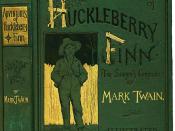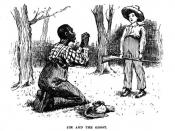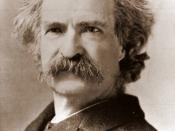Since Mark Twain published The Adventures of Huckleberry Finn in 1885, critics have considered it an excellent example of a story tracing the journey of a young man from childhood to adulthood. Through the years, readers have enjoyed seeing Huck grow from a young, carefree boy into a responsible young man with a decent sense of right and wrong. The "adventures" appeal to readers who had to make some of the same tough decisions Huck did in struggles with conscience.
When readers first meet Huck, he is living with the Widow Douglas and trying his best to conform to her rules. For example, when he wanted to smoke, "She said it was a mean practice and wasn't clean, and I must not try to do it any more" (4). Huck's immaturity shows in his reaction to her rule. He felt that she was "finding a power of fault in me for doing a thing that had some good in it" (4).
Huck is struggling with his conscience early in the novel. He knows that the widow is right, but his reaction is still childish.
Another character who tries to help Huck is the widow's sister, Miss Watson, who lives with them and was trying to teach Huck spelling. From Huck's standpoint, "Miss Watson she kept on pecking at me, and it got tiresome lonesome" (5). Huck's immaturity is obvious as he expresses his dislike of how Miss Watson wanted him to sit up straight and stop fidgeting. Huck's immaturity is clear in the beginning of the book.
All of Huck's discipline leaves his life as the book progresses, and Huck's father shows up to take him to live in a cabin in the woods. All of the bad habits from his past
return. Even though Huck does not miss the...


